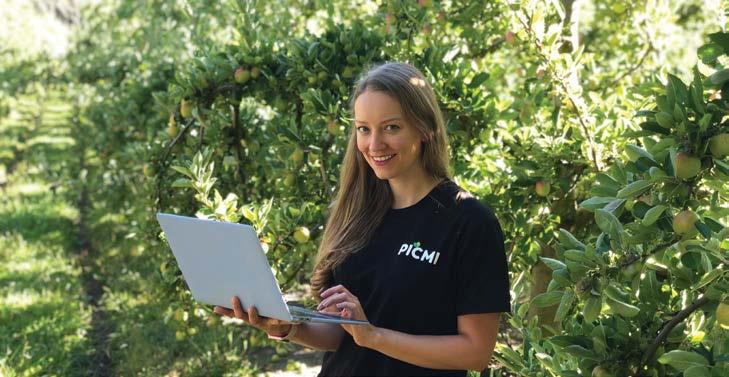
15 minute read
App speeds up recruitment
Genevieve Griffin-George, PICMI’s founder
Contactless recruiting – thanks to new App.
By Elaine Fisher
Growers and post-harvest operators can reduce the hassles and paperwork involved in recruiting staff by using an app which automatically selects those suited for the job.
Developed by Kiwi agritech start-up PICMI, the app enables employers to hire staff without meeting them face-to-face. For job seekers, it offers the chance to find out what they need to know about a job before applying, and all the ‘paperwork’ is done online. “If the applicant meets all the criteria for the position, they fill in their details and agree to the employment contract, which is usually completed within 20 minutes,” says Genevieve Griffin-George, PICMI’s founder. “Using our cloud-based tool we’re seeing growers reduce hiring time by 70% from application to contract to induction. For job seekers, we’re reducing the friction to find and do work. They know straight away if they have a job or not. Most job seekers apply for many jobs and then wait, hoping to hear back. “This causes frustration for both job seekers and growers, who find that many applicants aren’t actually available. We can increase the capacity of our labour force by enabling job seekers to find seasonal work that suits their needs and give them the flexibility to choose part-time or full-time seasonal work, based on location.” The idea for PICMI grew out of Genevieve’s experience of managing her family’s kiwifruit orchard near Motueka and the issues around finding, hiring and managing seasonal staff. She formed a team with two experienced technologists, and together they have been working alongside growers for more than a year to perfect the technology. “We are a mighty but a small team of three, dedicated to solving a problem for New Zealand growers, but one that’s a global problem too – the time it takes to hire people. We’ve built a tech that is easy to use and does what it should without being complex.”
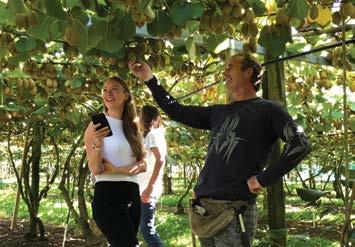
Genevieve Griffin-George with seasonal workers on the family kiwifruit orchard

On a personal level, Genevieve has found using the app has given her more time to spend with staff on her family orchard once they are hired, rather than being tied to a desk sorting through paperwork. “Employers can add induction and health and safety information, including videos, on the app and job seekers can upload all their personal details, including bank accounts, emergency contacts and IRD numbers, which are held securely on the platform and only released to the employer once they have signed the documentation accepting the job. “That means the employee can use their information for future job applications without having to find all that information again.” PICMI has already received industry attention with three Fieldays awards, and Genevieve has presented the app at TechCrunch in San Francisco and EvokeAg in Australia. Next season the company plans to launch globally. An estimated 24,000 seasonal positions need to be filled in kiwifruit orchards in the Bay of Plenty this harvest season, with thousands more across horticulture and viticulture industries around the country. And extreme weather events such as the January hailstorms and floods in the South Island have added extra complexity to the labour issue this year. “Covid-19 meant many growers had to change how they were hiring. They were concerned about the risks of employing someone before they met them face-to-face, but because of the savings, speed and ease using PICMI now they wouldn’t go back to any other system. “We’re already seeing PICMI deliver some fantastic results for customers. Our newest Bay of Plenty customer registered 670 job seekers, and 450 of them secured contracts to work this season. Forty-five percent of the contracts were signed within one hour and 80% within one day.”
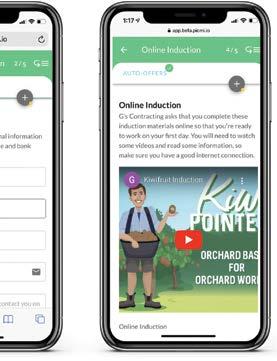
PICMI has important additional benefits for business. “It improves industry compliance and reporting integrates easily to flow data to other business systems. “To encourage growers and contractors to try it out, PICMI is offering ten free contracts. After that, it is pay as you go, so you only pay for what you use when you are hiring.”
AVO UPDATE
Reviewing our industry
By Jen Scoular : Chief Executive, NZ Avocado
It’s quite incredible the information we willingly (or inadvertently) give when we sign up for something as simple as a store or website loyalty programme.
Many people provide huge amounts of very personal information to Google, we share where we have been, in fact where we are, who we are with and so often, exactly what we ate. So it can’t be a privacy issue that is stopping three out of every four people checking in with the Covid-19 tracer app. We dislike compliance, but we all need to do better. Just do it, as Nike says.
Our industry is going through a review of its structure to ensure it is relevant now and for the future. We haven’t reviewed the structure for a long time, and with the significant growth in our industry, it’s timely to be asking the different types of grower and stakeholder what is important to them, and what works and doesn’t work. The board has shared the review report and is seeking further feedback prior to a full day meeting in late February. The diversity of our industry was highlighted. We have 1,800 orchards, although between 500 to 700 of them only produce fruit every few years. Our largest producing orchard is 120 hectares and we have new developments of orchards that will be up to 200 hectares. Yet the average sized orchard is less than three hectares. There are 50 orchards (4% of the total) over 10 hectares, and these produce 23% of the volume. Eighty percent of the volume comes from less than 40% of the orchards. Yet some of our smaller orchards are also highly productive, and some of the larger ones not so productive. The highest four-year average yield is over 30 tonnes per hectare, yet our average is less than 9 tonnes per hectare. According to a recent survey, 40% have been in the industry more than 15 years, 31% between five and 15 years and 29% have been in the industry less than five years.
That same survey highlighted that nearly 90% of respondents considered that all 12 areas we asked about, within the scope of NZ Avocado, were important to focus on. These include: • Supporting adoption of best practice to increase production per hectare • New research on productivity • Improving fruit quality • Reducing compliance costs and cost of production • Developing and maintaining New Zealand, Australian and Asian markets • Working together across the supply chain • New research
• Biosecurity Which makes us feel we are working in the right areas for growers. Reducing cost of production and reducing cost of compliance were highlighted as areas the industry is not managing well, an answer I suspect many other industries might also receive. Good value returns to avocado growers are dependent on being able to export to high value avocado markets around the world.
New Zealand’s avocado growing and export systems are recognised in our export markets for delivering safe, traceable, quality avocados to consumers. These export systems have enabled New Zealand to gain and retain access to high value markets ahead of many competitor supply countries. New Zealand currently benefits from good value returns in markets such as Australia, Thailand and Taiwan to which only a small number of other countries currently have sufficient systems and access to export their avocados. More, rather than less investment into compliance is the likely future in order to ensure growers are able to continue to leverage the value of the market access these export systems enable in a time of global pandemic.
Biosecurity 101: How MPI works to protect growers
Mike Inglis, Northern Regional Commissioner for the Ministry for Primary Industries (MPI), spoke to us about the biosecurity approach to Covid-19 and more broadly about how MPI works to reduce the impact of threats to growers.
By Heather Woods
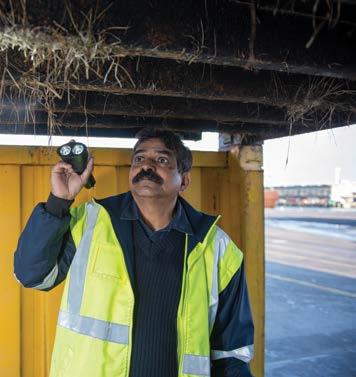
A Biosecurity team member inspects goods at a port to help prevent unwanted organisms from entering the country
The Covid-19 response
Mike Inglis says New Zealand – the people, the government, and the many agencies tasked with managing Covid-19 – has done an excellent job, and the small freedoms we appreciate now like going to the beach, to work or to the shops, are testament to that. From an MPI perspective, it has taken solid leadership, clear deliverables and an outcomes-focused plan for it to work, and those qualities are second nature for Mike, coming from a background in Corrections where there is a policy of driving performance and operational excellence to ensure successful leadership. And he’s a public servant at heart, so when Covid-19 made its grand entrance, the only option was to rally the troops and get down to business. Protecting people is the number one priority so a Covid-19 oversight group was formed to engage with the Ministry of Health, unions and public service agencies at the airports. In the early days where flights from China were the main concern, it was all about arranging appropriate PPE (personal protective equipment), physical screens being erected, and physical distancing – everything we now know as the physical changes required and which are vital for biosecurity risk assessment on the passenger side. In fact, the entire MPI response was aligned with the Ministry of Health, with well-being at the core of their communications for the ongoing support of staff health and safety. It has also been important to support essential workers; they have done us all proud, they have helped keep us safe.
Threats to New Zealand and how they’re managed
To be effective in managing threats at the border it is important to understand that the biosecurity system is not actually just about the border. Risks are managed through multiple layers of protection. Offshore agreements with other countries are in operation before people and cargo even reaches New Zealand. Countries exporting goods to New Zealand can help to mitigate the risk of biosecurity threats by following processes and procedures to ensure proper treatment and fumigation where required. On arrival at our border, goods are screened, passengers are scanned, and trained staff assess the high-risk targets and the likelihood of hitchhikers. If pests are found, they’re eradicated and managed quickly. Passenger non-compliance with biosecurity rules is usually unintentional, like forgetting an apple or orange in hand luggage, which makes targeting them difficult. But mistakes like that can be costly and allow threats like fruit flies to go undetected until it’s too late. Staff are expertly trained in risk assessment, have access to effective tools, and with the recent investment into new technology, scanners capable of automatic detection are adding a further layer of protection. In recent years, the explosion of e-commerce has resulted in an increase of seed and plant products ordered online making their way into the country. MPI have worked closely with offshore teams and directly with companies to make sure they are following due process, maintaining
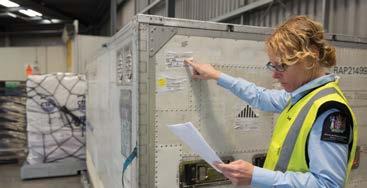



our import standards, and that health standards are also understood. There is a risk of animal products and untreated goods arriving via the international mail centre, which is why MPI is working with NZ Post and investing in a new, high-tech centre due in 2023. The team can’t physically inspect everything that crosses the border, but import documents are checked, audits are conducted, and high-risk items are clearance checked before release. So protection for growers and their livelihood is quite extensive.
Passenger and cargo hitchhikers
Technology helps the fight against biosecurity threats, but as it is not 100% foolproof someone must still physically inspect and identify risks. It is a joint intelligence effort between Customs and Biosecurity to target and decide what consignments are a potential risk, may contain insect pests, and monitor the country of origin. About 5% of all cargo has bio-material that requires assessment, such as fresh produce and plant materials. There is a very clear biosecurity system in place that must be maintained to keep New Zealand disease and pest-free. Transitional facilities around the country are also inspected by quarantine officers and approved staff for clearing cargo. The risk compliance rate is currently 98.9%. That means there’s only a 1.1% chance of a threat sneaking through. Messaging to passengers is very clear, and education is ongoing, but people still make costly mistakes. For instance, there is a risk of African swine fever entering the country from people bringing in meat products. Staff and dogs are trained to inspect and confiscate these items. In the opinion of Mike Inglis the biggest risk to growers coming across our borders are fruit flies and brown marmorated stink bugs (BMSB). Technically, they’re not ranked as two priority pests, but the impact they have has been seen first-hand, and fruit fly required full community support to eradicate it.
The Queensland fruit fly, the Pacific fruit fly and the Mediterranean fruit fly damage almost all fruit and vegetable crops, they limit trade and impact export markets. It is for that reason our health standards are so tight, to ensure imported fresh products are free from fruit flies and their eggs. There is also a national surveillance programme that actively watches for around one-hundred species of fruit fly, but in particular the Queensland fruit fly. There are about 7,500 pheromone traps around the country near airports, seaports and densely populated areas. So far, all large-scale removals have been successful.
BMSB is the other serious offshore threat to horticulture crops. They hide in cargo and confined spaces like machinery, and in mail, so mandatory offshore treatment is a key layer of protection. And that is one of the most successful programmes to date, collaborating with Australia officials to develop the offshore treatment programme that resulted in a reduction of BMSB interceptions by 73% in 2020. New import rules also take a hard line on sea cargo and vessels that don’t comply, with inspecting officers given the power to prevent the discharge of cargo and direct them to leave New Zealand.
Using detector dogs
Detector dogs are some of the hardest working members of the MPI team, and they have excellent ongoing training in both plant and animal risk. Covid-19 had an impact on the number of quarantine officers required at a passenger level and while they’ve been redeployed elsewhere, the capacity of detector dogs has been maintained. The training methods used for the dogs are approved and independently audited every twelve months. An entire centre, including kennels, is set up so the dogs can be put through their paces. Dogs are used for the detection of fruit flies, BMSB, and plant materials. And a close eye is kept ensuring there’s a good balance between plant and animal detection training. Training the dogs for each kind of threat is similar in terms of the response expected by the dogs, and the rewards they are given to maintain their detection behaviour.
Beyond the training and ongoing work carried out by the dogs, MPI uses awareness campaigns and education to position the dogs publicly as a line of defence. Detector dogs are reliable, intelligent, and a crucial part of the biosecurity strategy.
When threats evade biosecurity
It is impossible to prevent every threat from finding its way into our community – nature will always find a way and human errors happen. But it is important to know that if you spot a threat, securing it and engaging MPI quickly is the best thing to do. The NZ Pest hotline is available for this purpose and Mike Inglis said he would welcome direct calls to get on top of anything that poses a risk to growers or the wider New Zealand population and environment. The biosecurity pledge is to work together across borders, and that might mean physical borders, communities, regional stakeholders, or public service agencies. The goal is to identify problems and solve them quickly, before they become unmanageable, large-scale issues. Communication and engagement keeps conversations flowing and risky evaders at bay.
Growers: how to innovate safely
As growers, looking for new ways to work and new products and innovations in the horticulture sector is always top of mind. This might include sourcing new seed varieties or grafts from outside New Zealand. To do this safely, your best path forward is to engage MPI early. Everyone wants to be part of innovation in the sector, and early warning helps to plan for essential testing and monitoring. If we all play our part, growers can reach beyond the current scope of their business and take advantage of opportunities that may have previously felt out of reach, at the same time keeping our import standards high.
Heat Pump Food Dehydrators
For drying food in an easy and quick way, the economical solution to producing value added products, whether you’re looking to grow your product range or give a new business the kickstart it needs.
Nuts, Berries, Fruits, Vegetables, dry to Slices, Pieces and Powders, - with the end result being succulent, healthy, and tasty dried products every time. Unique Features: Because no hot vapour is lost during the drying process, no energy is wasted, achieving 100% energy recycled. Therefore highly efficient with low energy consumption. • WRH-100 Cabinet series can dry up to 100kg of fresh product • WRH-300 Cabinet series can dry up to 350kg of fresh product • AIO-500/600 Chamber series can dry up to 1500kg of fresh product
Contact us for free testing for your product, or more information: Netropolitan Ltd: 3 St. Georges Bay Rd, Parnell, Auckland Ph: 09 368 4416, Mob: 021 358 380 Email: sales@netropolitan.co.nz, www.netropolitan.co.nz/brand/ike/










